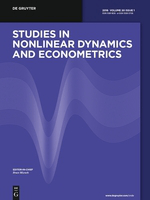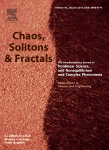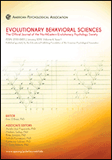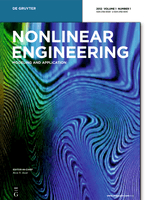
Nonlinear Dynamics Psychology and Life Sciences
Scope & Guideline
Advancing Understanding of Nonlinear Patterns in Life Sciences
Introduction
Aims and Scopes
- Nonlinear Dynamics in Psychological Processes:
The journal investigates how nonlinear dynamics apply to psychological phenomena, exploring topics such as decision-making, emotional responses, and cognitive processes. - Complex Systems and Adaptive Behavior:
Research in this area examines the behavior of complex systems, including social networks, organizational dynamics, and resilience, emphasizing how these systems adapt over time. - Mathematical Modeling in Life Sciences:
The journal publishes studies that utilize mathematical models to simulate biological, psychological, and social processes, providing insights into their underlying dynamics. - Interdisciplinary Approaches to Research:
A core aim is to foster collaboration between psychology, economics, sociology, and biology, encouraging researchers to adopt diverse methodologies and perspectives. - Application of Fractal and Chaos Theory:
The exploration of fractal and chaos theories is prominent, with applications in understanding patterns in human behavior, health, and environmental systems.
Trending and Emerging
- Resilience and Adaptability in Various Contexts:
Recent publications emphasize resilience, particularly in organizational and interpersonal contexts, reflecting its importance in navigating complex environments. - Agent-Based Modeling and Computational Approaches:
There is a growing trend towards utilizing agent-based models to simulate complex interactions within systems, providing deeper insights into dynamic behaviors. - Fractal Analysis in Behavioral Studies:
The application of fractal analysis to study behavior and physiological responses is gaining traction, revealing intricate patterns in human dynamics. - Impact of Environmental Factors on Health and Decision-Making:
Emerging themes explore how environmental and contextual factors influence health outcomes and decision-making processes, particularly in light of recent global challenges. - Interdisciplinary Integration of Nonlinear Dynamics:
A trend towards integrating nonlinear dynamics across various disciplines, including psychology, economics, and biology, is evident, fostering innovative research collaborations.
Declining or Waning
- Traditional Psychological Constructs:
Papers focusing on traditional psychological constructs without nonlinear or complex system frameworks have become less frequent, indicating a shift towards more dynamic and integrative approaches. - Static Models of Human Behavior:
Research employing static models that do not account for the complexity and fluidity of human behavior is waning, as the journal increasingly favors dynamic modeling techniques. - Simplicity in Economic Theories:
There is a noticeable decline in publications centered on simplistic economic theories, as the journal moves towards more complex and nuanced analyses that reflect real-world dynamics. - Linear Approaches to Social Phenomena:
Studies that utilize linear methodologies to analyze social phenomena are appearing less frequently, suggesting a growing preference for nonlinear perspectives.
Similar Journals

STUDIES IN NONLINEAR DYNAMICS AND ECONOMETRICS
Innovating Analytical Techniques for Dynamic ResearchSTUDIES IN NONLINEAR DYNAMICS AND ECONOMETRICS, published by Walter de Gruyter GmbH, is a leading journal that explores the intersections of nonlinear dynamics, econometric modeling, and their applications across various fields. Since its inception in 2002, this journal has been dedicated to disseminating high-quality research that challenges conventional methodologies and promotes innovative analytical techniques in economics and social sciences. With an impressive impact through its rankings, being placed in the Q3 category for Analysis and Econometrics, and achieving a Q2 ranking in Social Sciences (miscellaneous) as of 2023, it serves as a vital resource for scholars and practitioners aiming to deepen their understanding of complex systems and dynamic processes. The journal facilitates open discourse and comprises contributions from both emerging and established researchers, fostering an academic environment that prioritizes rigorous peer-reviewed scholarship. Researchers are encouraged to access its rich content, which provides insights into contemporary methodologies and empirical findings, further enhancing the discourse surrounding nonlinear dynamics and statistics. For more information and to explore the latest research, please visit its page on the publisher's website.

PHYSICAL REVIEW E
Connecting Researchers with Cutting-Edge KnowledgePHYSICAL REVIEW E, published by the American Physical Society, stands as a premier journal in the fields of condensed matter physics, statistical and nonlinear physics, and statistics and probability. With an ISSN of 2470-0045 and an E-ISSN of 2470-0053, this journal prides itself on providing cutting-edge research and insights, contributing significantly to the advancement of knowledge since its inception in 1993. Currently, it boasts a Q1 ranking in Condensed Matter Physics and a Q2 ranking in both Statistical and Nonlinear Physics and Statistics and Probability, highlighting its relevance and impact within these fields. PHYSICAL REVIEW E is particularly renowned for its commitment to disseminating high-quality, peer-reviewed articles that address fundamental questions and emergent phenomena, making it an essential resource for researchers, professionals, and students alike. As it converges years from 1993 to 2024, the journal continues to foster a collaborative environment for innovative research while maintaining accessibility for a global audience.

Communications in Analysis and Mechanics
Connecting researchers to inspire the future of mathematical sciences.Communications in Analysis and Mechanics is a pioneering journal published by the AMER INST MATHEMATICAL SCIENCES (AIMS), dedicated to advancing the fields of mathematics, engineering, and applied sciences. With its recent transition to Open Access in 2023, the journal aims to enhance the dissemination of high-quality research by fostering a collaborative environment for researchers, professionals, and students. Operating from the United States, this journal embraces a broad scope encompassing geometry, optimization, and mechanics, ensuring a comprehensive platform for innovation and critical discourse. Despite its nascent status, it features competitive Scopus rankings in various disciplines, notably achieving a percentile around 7th to 13th, indicative of its growing impact among peers. The editorial team is committed to publishing original research that addresses significant challenges and developments within the mathematical sciences, facilitating a vital exchange of ideas and methodologies.

Complex Systems
Pioneering Research for Tomorrow's Complex ChallengesComplex Systems is a pivotal journal published by Complex Systems Publications Inc, specializing in the interdisciplinary field of complex systems science. With an ISSN of 0891-2513, it focuses on advancing the understanding of complex phenomena across various domains, including computer science and control engineering. Operating from the United States, this journal has established itself as a credible source with a current impact factor reflecting its relevance—ranking in the Q3 category for both Computer Science (miscellaneous) and Control and Systems Engineering as of 2023. Although it does not offer Open Access, Complex Systems aims to facilitate the exchange of cutting-edge research and innovative methodologies, making it indispensable for researchers, professionals, and students eager to explore and contribute to the field. With coverage spanning from 2012 to 2024, it strives to foster a deeper understanding of the principles governing complex systems, thus paving the way for future technological advancements and theoretical developments.

CHAOS SOLITONS & FRACTALS
Innovating the Future of Nonlinear Dynamics ResearchCHAOS SOLITONS & FRACTALS, published by Pergamon-Elsevier Science Ltd, stands as a premier journal in the fields of mathematical physics, applied mathematics, and nonlinear dynamics. With an impressive impact factor and a 2023 ranking placing it in the Q1 quartile for both applied mathematics and mathematical physics, this journal serves as an essential platform for groundbreaking research and innovative theories that explore the complex interplay between chaos, solitons, and fractal structures. Established in 1991 and converging research until 2024, the journal features rigorous peer-reviewed articles that appeal to academics, professionals, and students alike, facilitating the dissemination of knowledge within a community passionate about statistical and nonlinear physics. Although not open access, its rich content is critical for those seeking to deepen their understanding and advance their work in these dynamic and multifaceted areas of study.

Journal of the Royal Society Interface
Advancing Knowledge Across BoundariesJournal of the Royal Society Interface is a premier interdisciplinary journal dedicated to the convergence of life sciences, physical sciences, and engineering. Published by the esteemed Royal Society in the United Kingdom, this journal serves as a dynamic platform for innovative research that pushes the boundaries of both fundamental and applied science. With a significant impact factor and ranked in the prestigious Q1 category across multiple domains, including Biochemistry, Bioengineering, and Biomedical Engineering, the journal consistently prioritizes high-quality contributions that innovate and inspire. Accessible to researchers, professionals, and students alike, it aims to cultivate a deeper understanding of complex interactions and synergies among biological and physical systems. From its inception in 2004 to its evolving knowledge contributions through 2024, the Journal of the Royal Society Interface plays a pivotal role in shaping future research directions and fostering collaboration across scientific domains.

Adaptive Human Behavior and Physiology
Fueling Research in Human Behavioral AdaptationAdaptive Human Behavior and Physiology, published by Springer Heidelberg, is a pivotal journal in the fields of behavioral neuroscience, experimental and cognitive psychology, and physiology. With its ISSN 2198-7335, this quarterly journal serves as a forum for innovative research that explores the intricate relationships between human behavior and physiological processes. Although currently categorized within the Q4 and Q3 quartiles for various psychological and physiological domains, this journal has rapidly established itself as a significant resource for cutting-edge studies from 2015 to 2024. The journal’s commitment to high-quality research is reflected in its Scopus rankings, positioning it among noteworthy publications, particularly in experimental psychology and neuroscience. This journal is vital for researchers, professionals, and students seeking to deepen their understanding of adaptive behaviors and the underlying physiological mechanisms. Join the discourse and contribute to this evolving field through your scholarship in Adaptive Human Behavior and Physiology.

Evolutionary Behavioral Sciences
Transforming Behavioral Science with Evolutionary PerspectivesEvolutionary Behavioral Sciences, an esteemed journal published by the American Psychological Association, offers a compelling platform for researchers and professionals engaged in the fields of Experimental and Cognitive Psychology and Social Psychology. With an ISSN of 2330-2925, this journal has been a vital resource since its inception in 2014, aiming to bridge the gap between evolutionary theory and behavioral science, thereby fostering an interdisciplinary dialogue among scholars. Despite its current Q3 ranking in both relevant categories, it is poised for growth and increased visibility within the academic community, addressing contemporary issues through rigorous empirical research and theoretical advancements. Access to the journal is restricted, which bolsters its scholarly integrity, while its publication from one of the leading psychological associations signifies its commitment to excellence in behavioral research. Through the convergence of innovative studies and evolving methodologies, Evolutionary Behavioral Sciences underscores the importance of understanding human behavior from an evolutionary perspective, making it an essential read for anyone interested in the dynamics of behavior, cognition, and social interaction.

Journal of Computational and Nonlinear Dynamics
Advancing the Frontiers of Computational Dynamics.Welcome to the Journal of Computational and Nonlinear Dynamics, a leading publication in the fields of applied mathematics, control and systems engineering, and mechanical engineering, published by the esteemed American Society of Mechanical Engineers (ASME). With an ISSN of 1555-1423 and an E-ISSN of 1555-1415, this journal has been a vital resource since its inception in 2006, promoting high-quality research and innovative methodologies aimed at solving complex engineering problems. With a commendable impact in academic circles, it ranks in the Q3 quartile for Applied Mathematics and Control and Systems Engineering, and Q2 for Mechanical Engineering as of 2023. The journal facilitates the dissemination of research findings, theoretical advancements, and practical applications, making it an essential platform for researchers, professionals, and students looking to advance their knowledge and engage with cutting-edge dynamics research. While currently not available as an open-access publication, subscribers benefit from a wealth of scholarly articles that contribute to the academic community's understanding of computational and nonlinear dynamics in various engineering disciplines.

Nonlinear Engineering - Modeling and Application
Shaping the Future of Modeling and SimulationNonlinear Engineering - Modeling and Application is a premier journal dedicated to advancing the fields of engineering, modeling, and simulation, published by De Gruyter Poland Sp. z o.o. since 2012. With an impressive impact factor reflected in its prestigious rankings—Q2 in Chemical Engineering and Miscellaneous Engineering and Q3 in Computer Networks and Communications—this journal serves as an invaluable resource for researchers and practitioners seeking to explore the intricacies of nonlinear systems and their applications. As an Open Access journal since 2019, it ensures that groundbreaking research is readily available to the global community, fostering collaboration and innovation. Situated at the forefront of its field, Nonlinear Engineering provides high-quality, peer-reviewed articles that contribute to understanding complex phenomena in various engineering disciplines, making it an essential publication for those eager to stay on the cutting edge of technology and research.